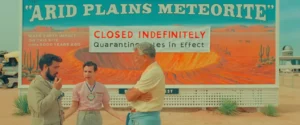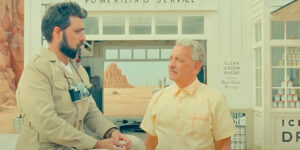Asteroid City (2023) review
Dir. Wes Anderson
By: Steve Pulaski
Rating: ★★½
Wes Anderson’s Asteroid City assembles one of the largest and most impressive ensemble casts this side of a Knives Out movie. It speaks to the depth of the casting when Bryan Cranston and Margot Robbie were curiously absent from the film’s initial trailer. Some movies demand a rewatch due to their intricate layers and nuances. Asteroid City is the first film I felt I’d rewatch down the road because I might’ve missed an A-lister at some point.
Asteroid City fuels both sides of the argument when it comes to Anderson: he either shuns any and all criticisms of his movies or he doubles down on his idiosyncrasies without a care. His desire to construct diorama-esque settings with meticulous color-balance and detail remains the most intriguing aspect of his pictures. His neat and orderly, dead-centered shots are a thing of immaculate craft. Once more, however, I’m left waxing poetic about the way one of his films is presented because I have desperately little to say about yet another one of his unengaging noodlings.
Asteroid City is Anderson’s attempt at a metatextual narrative. There are two distinct storylines taking place, with the majority of the film presenting a playwright’s text “Asteroid City” using a 1950s, Technicolor-era aesthetic. The frame-work, if you will, involves a TV host (Bryan Cranston) introducing a televised production of the play, which is a work of Conrad Earp (Edward Norton). Anderson shoots the behind-the-scenes machinations in black-and-white with a 1:33:1 aspect ratio. When the story of “Asteroid City” actually commences, the screen expands to 2:35:1 and we’re entranced by hyper-realistic colors.

Cranston also serves as the film’s narrator, who contextualizes the life of Earp as he tries to write “Asteroid City” and produce it for the big screen for this anthology series. The actual story — the one you came for based on the trailers and other paratext — revolves around a war photographer named Augie Steenback (Jason Schwartzman), his son, Woodrow (Jake Ryan), and their three young daughters. They’ve come to the desert town of Asteroid City so Augie can accept the Junior Stargazer Award at an astronomy convention. Augie’s wife (Margot Robbie) has passed away, but Augie hasn’t told the children. His father-in-law, Stanley (Tom Hanks), is due to make the trip to Asteroid City, and demands that his grandchildren know by the time he gets there.
Asteroid City would be considered a sleepy town if things such as seismic blasts, due to atom bomb testing nearby, didn’t rock the region at random. As the family awaits the convention, Augie meets and befriends Midge Campbell (Scarlett Johansson), a popular actress of the era who is taking her daughter to the same expo. Junior Stargazer is run by General Grif Gibson (Jeffrey Wright) and astronomer Dr. Hickenlooper (a very good Tilda Swinton), who, along with the townspeople, start to observe some very interesting phenomena. A UFO appears in the sky above an asteroid crater, and at one point, an alien emerges to steal the meteorite that caused the crater. This sends General Gibson into a panic, and he quarantines the town in effort to devise a cover-up.
A litany of other actors make appearances in everything from bit parts to cameos. Steve Carell earns big — well, big for this understated movie — laughs as a motel manager; Liev Schreiber is another dad of a Junior Stargazer award recipient; Willem Dafoe is an acting teacher; Matt Dillon is a hapless mechanic; Adrien Brody is the director of Earp’s adapted play; Jeff Goldblum is an alien; and if you pay attention, you’ll spot Sophia Lillis, Rita Wilson, Rupert Friend, and even more familiar faces.

One of my biggest fears for Asteroid City was that the enormous cast would result in actors and characters being overshadowed. That’s pretty much what happens early and often here. It doesn’t help that everyone recites Anderson’s fussy and embellished dialog with such monotone delivery that it practically encourages your mind to wander. Those who can break the mold, like Carell and Swinton, do so by finding ways to deliver Anderson’s desert-dry witticisms with even the slightest inflection or comic timing.
Asteroid City is a marvelous technical achievement; yet another for Anderson. In addition to the aforementioned lighting and colorization work (with the help of his longtime ace cinematographer Robert Yeoman), he finds a way to incorporate stop motion animation during the alien’s tantalizing arrival. The eclectic music score is peppered with fun country ditties and original songs, primarily performed by the kids of Asteroid City (my favorite being “Dear Alien (Who Art in Heaven)” for its plucky arrangements.
Alas, this is a movie of small moments that adds up to a largely plotless whole that frequently stalls under the weight of its own inertia. A perfect example of this is when a group of the Junior Stargazers gather to play a memory game. They sit in a circle: one kid names a “famous” figure (IE: Jagadish Chandra Bose), then the next kid repeats that person and adds another (Antonie van Leeuwenhoek), then the next kid repeats the last two and adds another, and so on. This goes on for five minutes. The joke is the characters are naming figures that kids their age probably wouldn’t know, although there is the occasional Cleopatra or Mickey Mantle name-drop. It exists to be cute and whimsical. I found it grating.
I’ve feared since Isle of Dogs was likable albeit slightly underwhelming that Anderson might’ve peaked at The Grand Budapest Hotel, and with each subsequent film, that concern feels heightened. Wes Anderson films are starting to be better in theory than they are in practice. Reactionary Letterboxd reviews are quick to bill them as “pure cinema” or something along those lines. For me, they’ve regressed into pure design.
NOTE: As of this writing, Asteroid City is now playing in theaters and streaming on several VOD platforms.
REVIEWS OF OTHER WES ANDERSON FILMS:
My review of Bottle Rocket (1996)
My review of Rushmore (1998)
My review of Moonrise Kingdom
My review of The Grand Budapest Hotel
My review of Isle of Dogs
Starring: Jason Schwartzman, Scarlett Johansson, Tom Hanks, Jeffrey Wright, Tilda Swinton, Bryan Cranston, Edward Norton, Adrien Brody, Liev Schreiber, Hope Davis, Stephen Park, Rupert Friend, Maya Hawke, Steve Carell, Matt Dillon, Hong Chau, Willem Dafoe, Margot Robbie, Tony Revolori, Jake Ryan, Sophia Lillis, Rita Wilson, Ethan Josh Lee, and Jeff Goldblum. Directed by: Wes Anderson.
About Steve Pulaski
Steve Pulaski has been reviewing movies since 2009 for a barrage of different outlets. He graduated North Central College in 2018 and currently works as an on-air radio personality. He also hosts a weekly movie podcast called "Sleepless with Steve," dedicated to film and the film industry, on his YouTube channel. In addition to writing, he's a die-hard Chicago Bears fan and has two cats, appropriately named Siskel and Ebert!


